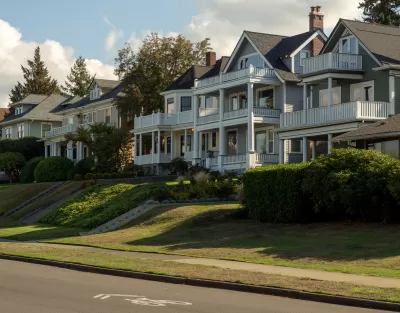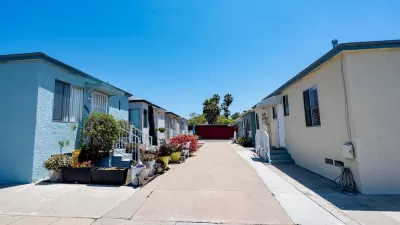The new law will prevent local governments from prohibiting the development of coliving multifamily development through zoning and other regulations.

Washington Governor Jay Inslee signed a bill in March that clears the way for coliving. With rents across the state soaring and supply of affordable housing far below demand, the new law is aimed at boosting versatile and affordable options across the state, reports Lauren Rendahl with the Spokesman-Review.
The new law, which will go into effect in June, requires cities and counties to allow coliving permitting housing on residential lots where at least six multifamily housing units are permitted by January 2026 and prohibit regulations against their development.
“Additionally, local governments cannot mandate off-street parking within half a mile of a major transit stop or require more than one off-street parking space per sleeping unit for this housing style,” Rendahl writes.
Coliving, also known as cohousing, developments are a type of housing that is communal in nature, typically involving multiple units within a single home or a cluster of single-family homes or condos on a single lot that share common spaces. But their development is often prohibited by local zoning laws, including restrictions on the number of units per parcel, the relationships or number of occupants per unit, and off-street parking minimums (neighborhood residents often oppose these type of developments out of concern for increased demand for street parking). That said, major cities across the country, including Washington, D.C. and Houston, have been experimenting with cohousing in recent years as a way to provide affordable living options to residents.
FULL STORY: Co-living residential housing is coming to Washington after Inslee signs bill into law

Study: Maui’s Plan to Convert Vacation Rentals to Long-Term Housing Could Cause Nearly $1 Billion Economic Loss
The plan would reduce visitor accommodation by 25,% resulting in 1,900 jobs lost.

Alabama: Trump Terminates Settlements for Black Communities Harmed By Raw Sewage
Trump deemed the landmark civil rights agreement “illegal DEI and environmental justice policy.”

Why Should We Subsidize Public Transportation?
Many public transit agencies face financial stress due to rising costs, declining fare revenue, and declining subsidies. Transit advocates must provide a strong business case for increasing public transit funding.

Paris Bike Boom Leads to Steep Drop in Air Pollution
The French city’s air quality has improved dramatically in the past 20 years, coinciding with a growth in cycling.

Why Housing Costs More to Build in California Than in Texas
Hard costs like labor and materials combined with ‘soft’ costs such as permitting make building in the San Francisco Bay Area almost three times as costly as in Texas cities.

San Diego County Sees a Rise in Urban Coyotes
San Diego County experiences a rise in urban coyotes, as sightings become prevalent throughout its urban neighbourhoods and surrounding areas.
Urban Design for Planners 1: Software Tools
This six-course series explores essential urban design concepts using open source software and equips planners with the tools they need to participate fully in the urban design process.
Planning for Universal Design
Learn the tools for implementing Universal Design in planning regulations.
Smith Gee Studio
Alamo Area Metropolitan Planning Organization
City of Santa Clarita
Institute for Housing and Urban Development Studies (IHS)
City of Grandview
Harvard GSD Executive Education
Toledo-Lucas County Plan Commissions
Salt Lake City
NYU Wagner Graduate School of Public Service





























